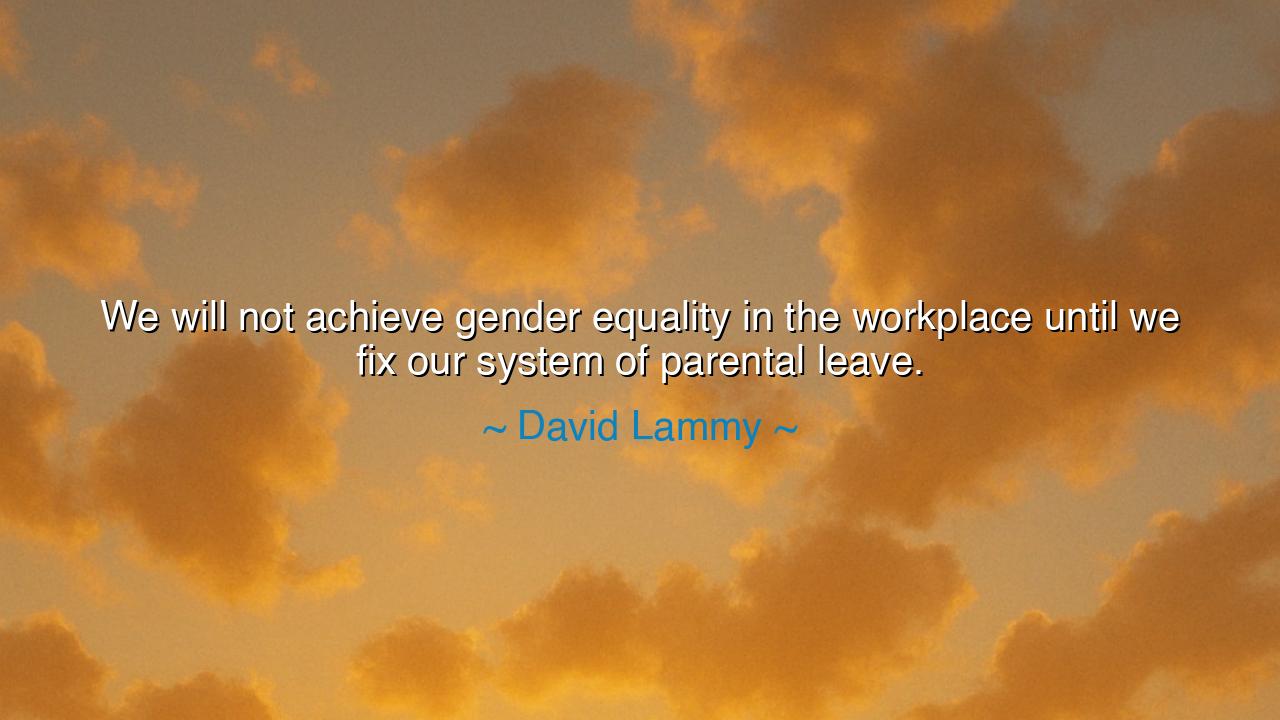
We will not achieve gender equality in the workplace until we fix
We will not achieve gender equality in the workplace until we fix our system of parental leave.






In the words of David Lammy, a voice of justice and balance in our modern age, we hear a truth both simple and profound: “We will not achieve gender equality in the workplace until we fix our system of parental leave.” Though spoken in the language of policy, these words carry the weight of moral vision. They are not merely about economics or employment—they are about fairness, compassion, and the ancient duty of society to uphold harmony between the labors of men and women. For Lammy reminds us that the roots of inequality do not lie only in hearts and minds, but in the very structures that shape our daily lives.
The meaning of this quote stretches beyond its immediate subject. To speak of “parental leave” is to speak of how a civilization values care, family, and the continuation of life itself. If a society glorifies ambition but neglects the hands that raise its children, it has already divided its people into unequal halves. Lammy’s insight is that gender inequality does not begin when a woman is denied a promotion or a seat of power—it begins the moment motherhood is treated as a private burden rather than a shared social duty. It begins when fathers are discouraged from nurturing and when mothers are punished for doing so. Until that balance is restored, equality remains a word, not a reality.
The origin of Lammy’s thought lies in centuries of imbalance. In the old order of things, the realm of work belonged to men, and the realm of care to women. This division was not born of nature, but of tradition and convenience, passed from age to age like a flawed inheritance. Women were told that to nurture was their destiny, and men that to nurture was their weakness. Thus, when the modern world opened its gates to women, inviting them into the spheres of science, politics, and commerce, it did so without altering the foundations beneath. It offered freedom without support, opportunity without reform. And so, the burden of care remained upon one gender’s shoulders, disguised by progress yet unchanged in spirit.
In many nations today, the system of parental leave reveals the soul of society more clearly than any speech or law. Consider the Nordic countries—Sweden, Norway, Iceland—where both mothers and fathers are granted generous and equal leave, where a father’s embrace is as natural as a mother’s. There, the workplace flourishes not because one gender sacrifices more, but because both are honored equally. Contrast this with countries where maternity leave is meager, where paternity leave is rare or shamed. There, the imbalance persists: women step back from their professions not by choice but by necessity, and men are denied the chance to share in the sacred labor of early life. Thus, inequality is not only a moral failing but a structural one—built into the very rhythm of work and home.
History, too, teaches this truth. In the time of Sparta, women were trained to be strong and active in the life of the polis, for the Spartans knew that a weak mother could not raise a strong warrior. They understood, in their own way, that society cannot flourish unless it respects both the creation of life and its defense. But elsewhere, even in great civilizations, women were hidden from power, their motherhood used as a reason to silence them. It was not until the modern age that voices like Lammy’s rose to declare: the balance of parenthood is the balance of civilization itself. When care is honored as much as conquest, when compassion is valued as much as ambition, then shall equality be born anew.
The lesson is clear and urgent. If we would see a world of gender equality, we must begin not in the boardroom, but in the cradle. We must rebuild our systems so that both men and women can share in the first duties of life without fear of losing the fruits of their labor. Employers must see that supporting families is not charity, but wisdom. Governments must see that paid parental leave is not expense, but investment—the seed of a more stable, just, and prosperous people. And we, as individuals, must change the way we see care itself—not as weakness, but as the highest strength.
Therefore, let David Lammy’s words be remembered as both prophecy and guide: “We will not achieve gender equality in the workplace until we fix our system of parental leave.” It is a call to justice that touches the roots of human life. For the hand that rocks the cradle shapes the mind that rules the world, and until both hands—male and female alike—are free to do so, humanity will remain divided against itself. Let us, then, build a society where parenthood is not a private struggle but a shared triumph, where every child is born into equality because every parent is honored in it. Only then shall we call our civilization whole.






AAdministratorAdministrator
Welcome, honored guests. Please leave a comment, we will respond soon